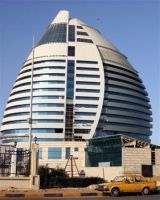Oil bonanza strains Sudan social fabric
March 11, 2007 (KHARTOUM) — Sudan’s economic liberalisation is spurring huge foreign investment and spectacular growth, but observers warn uneven social redistribution could only add to the restive country’s woes.
 Over the past two years, futuristic hotels, malls and swanky cafes have mushroomed across the heart of Khartoum, a low-rise city of brick buildings and sandy alleyways that had changed little since British rule.
Over the past two years, futuristic hotels, malls and swanky cafes have mushroomed across the heart of Khartoum, a low-rise city of brick buildings and sandy alleyways that had changed little since British rule.
“I saw a guy in a suit driving a Humvee the other day,” says Paul Kwok, a young Sudanese who ekes out a living driving a rickshaw. “Where did he get the money to buy such a car?”
“I bet you it’s with oil from my country,” says the 23-year-old, a native of southern Sudan and one of the millions of displaced people who have been regurgitated by the bustling city centre into squalid peripheral camps.
The Sudanese government forecasts a whopping 13 percent growth rate in 2007, as economic indicators continue their exponential rise on the back of a booming oil industry established mainly in the south.
The latest symbol of Sudan’s new wealth is “Kadhafi’s Egg”, the nickname given by locals to a Libyan-funded hotel sprouting out of the Nile river bank in the shape of a bulging oval structure of concrete and steel.
It was preceded by the Rotana hotel, which gave Khartoum its first five-star facilities and was inaugurated last month by Sudan’s president, Omar al-Beshir.
While Africa’s largest country is being bled by civil unrest and a dire humanitarian crisis, its erstwhile sleepy capital is bristling with enterprise and undergoing unprecedented changes.
Khartoum has become an unlikely Eldorado for many foreigners seeking a quick buck — multinational luxury car dealers and migrant workers from neighbouring African countries alike.
“I have worked in Saudi Arabia and Lebanon, but the money’s never been as good as this,” says Fuad Abdel Moneim, a construction engineer employed on a one-year contract north of Khartoum.
“This country is unbelievable right now, everything needs to be done and anyone can just come and pick up a contract.”
Despite US sanctions, foreign direct investment soared to around 2.3 billion dollars last year in Sudan, one of the African continent’s prime hunting grounds for Asia’s energy-hungry economies.
But as Khartoum sees the emergence of a new elite cashing in on a liberalised economy, the majority of the country’s population is reaping nothing but higher prices.
In some neighbourhoods, the presence of thousands of oil industry workers and United Nations staff has sent rents skyrocketing to levels almost comparable with Paris or London.
Basic services are also becoming a luxury.
“The state has deserted us. Even the electricity is privatised now, if you don’t put money in the counter, the power is cut off … What is making some very rich is choking the rest,” says Amina, a young part-time university lecturer earning 300 dollars a month.
Observers argue that many of the conflicts in Sudan — whether raging in Darfur, smouldering in the East or brewing in the north — are fueled by economic marginalisation and the struggle for resources.
“Seen at the macro-economic level, there is undeniable growth. But the story these numbers don’t tell is the social cost of liberalisation for most Sudanese,” says Barbara Casciarri, an anthropologist who heads the French research centre CEDEJ in Khartoum.
“If you scratch underneath the usual religious-ethnic label of the conflict, what you have in Darfur is the competition for access to resources,” she argues.
Mohammed Kabaj, a veteran economist, also says the repeated failure to give the country’s various regions equal education, health and development opportunities has been the main cause of instability.
“In 1997, no less than 96 percent of the population of Darfur lived under the poverty line. I went there and told the government that war was coming to Darfur. It’s the same story in the East,” he says.
“In Sudan, three quarters of the population still lives off the land and the real locomotive of development is agriculture,” Kabaj adds.
“The regime is currently thinking of modernising its military, but when the time of repayment comes, if oil prices go down, it will be a catastrophe. Let’s modernise society first and then we’ll see how we can protect it.”
(AFP)
